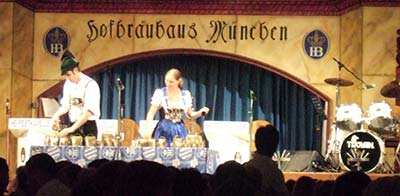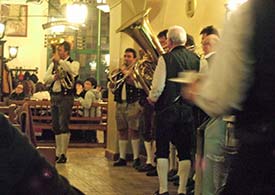| Munich Index | Germany Index |
|
|
Hofbräuhaus München ABOVE: A folklore show in the Festival Hall, which seats 900 guests. INSET BELOW: Personal mugs owned by Hofbräuhaus regulars, and a tourist working on his fitness regime.
The Hofbräuhaus München traces its origins to 1589, when Duke Wilhelm V commissioned a brewery near the site of the current building. In 1607, Maximilian I built a Weißbier brewery on the Platzl (where the current beer hall is located), and in 1828, King Ludwig I opened the court brewery to the general public. The brewery was moved to the River Isar in 1896, and in 1897 a new beer hall--the current Hofbräuhaus--opened its doors to thirsty Münchners, German tourists, and foreign visitors.
Where to eat and drink:The big and lively Schwemme, or main taproom, is on the main floor. It's the heart and soul of the Hofbräuhaus, with long tables, an oompah band, Bretzl ladies wandering the aisles with baskets of pretzels, and a capacity of 1,300 people. A smaller connecting room, Stadelheim, was once reserved for staff from Munich's prison of the same name. For a more refined atmosphere, head for the smaller Bräustube on the first floor (or second floor, if you're from the U.S.). The Festival Hall--on the top floor--has traditionally offered a nightly "Bavarian Evening" buffet and folklore show. The price is reasonable, and the food is surprisingly good, with such specialties as crisp-skinned roast pork, sausages, grilled chicken, and a wonderful apple strudel in the all-you-can-eat buffet line. (The show is excellent, too, with first-rate musicians and customers who frequently jump up on tables during choruses of "In München steht ein Hofbräuhaus.") In summer, up to 400 people can eat and drink in the tree-shaded beer garden.
 ABOVE: The Hofbräuhaus München oompah band makes its rounds of the Schwemme, or main taproom, on the ground floor. Location of the Munich Hofbräuhaus:The Hofbräuhaus is on the Platzl, within a couple of minutes' walking distance of the Marienplatz in downtown Munich. For more information, see the Hofbräuhaus Web site. Hours and shopping:The Hofbräuhaus opens daily at 9 a.m., including Christmas and other major holidays. Closing time is midnight, with drinks being served until 11:30 p.m. The Hofbräuhaus München has a shop inside the main entrance where you can buy everything from traditional stoneware beer mugs to logo wear and trinkets. (Merchandise is also available for purchase online.) Table etiquette:In the taproom and beer garden, it's customary to share tables. If you feel awkward sitting down with strangers, try visiting when the Hofbräuhaus is less crowded (e.g., outside of normal meal hours or after 10 p.m.). Important: Don't sit at tables that are marked "Reserviert." The Hofbräuhaus has many drinking associations, clubs, corporate groups, etc. that meet on a regular basis, and you won't be welcome if you plop yourself down at a table reserved for German Patent Office workers or police pensioners. Web links:Hofbräuhaus München
Beer Drinker's Guide: Hofbräuhaus
About the author:
After 4-1/2 years of covering European travel topics for About.com, Durant and Cheryl Imboden co-founded Europe for Visitors (now including Germany for Visitors) in 2001. The site has earned "Best of the Web" honors from Forbes and The Washington Post. For more information, see About Europe for Visitors, press clippings, and reader testimonials. 2nd inset photo copyright © Andreas Weber. |
|
| Germany for Visitors - Home | | Europe for Visitors - Home | | Contact information, disclosures, audience | Copyright © 1996-2025 Durant and Cheryl Imboden. All rights reserved. |